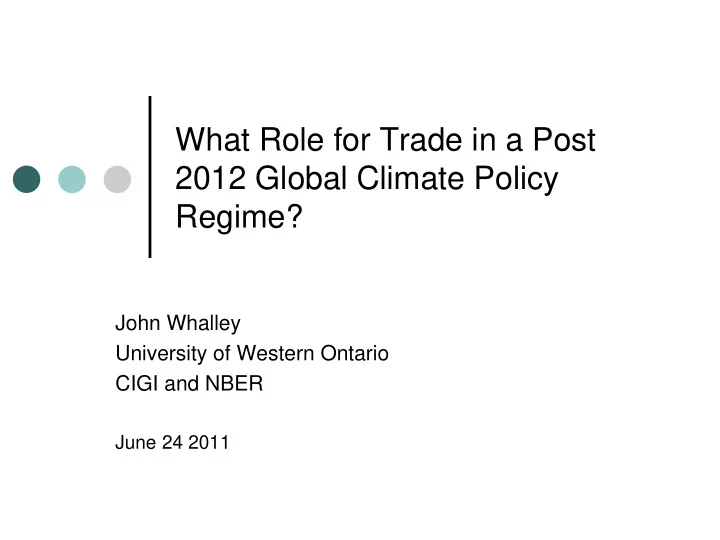

What Role for Trade in a Post 2012 Global Climate Policy Regime? John Whalley University of Western Ontario CIGI and NBER June 24 2011
1. Main Themes Little formal role for trade in Copenhagen/Cancun/Durban process; but it lurks in the background As addition to the bargaining set trade, in principle, widens the bargaining set and can be a facilitator of a global climate regime Trade policy can be an instrument for the implementation of a global climate regime since trade policy can be mechanism for achieving second best internalization. This can, however, also make negotiation more difficult with developing countries Little time left to exploit linkage in Durban, and prognoses for Durban pessimistic
1. Main Themes Key things trade cannot do resolve property rights issues (i) act as compensation (ii) achieve full internalization (iii) Contribution of trade in concluding UNFCCC negotiations that is needed is to be judged against existing unilateral committments
Trade Climate Linkage Institutional Evolution of Linkage Bretton Woods 1960’s environment movement Global environmentalism in 1980’s Precedence of trade regime Elements of linkage Direct Bargaining linkage Implementation issues
Trade Climate Linkage Direct Interactions Results from numerical equilibrium models Bargaining Interactions Access in goods/services Linkage in Implementation Border Tax Adjustments Finance Transfers
Trade in Negotiations Thus Far Rio 1992 UNFCCC 1994 – CBDR Kyoto 1997 Bali 2007 Copenhagen 2009 – Copenhagen Accords Post Copenhagen BTA issue
What Role Can Trade Play in Helping Advance the UNFCCC Process? Trade in goods and services / trade in emissions rights Expanding the bargaining set Contingent trade measures as penalty system Efficiency and fairness considerations in use of these trade measures
Potential Impacts of Border Tax Adjustments The older VAT debate Neutrality Results Basis for calculation of carbon adjustment Sector specificity Discrimination WTO issues What do equilibrium models suggest?
Concluding Remarks Trade’s formal role short term not developed, but lurks as major consideration View climate as addition to global policy mix for negotiated cooperation Institutional issues to the fore
Recommend
More recommend